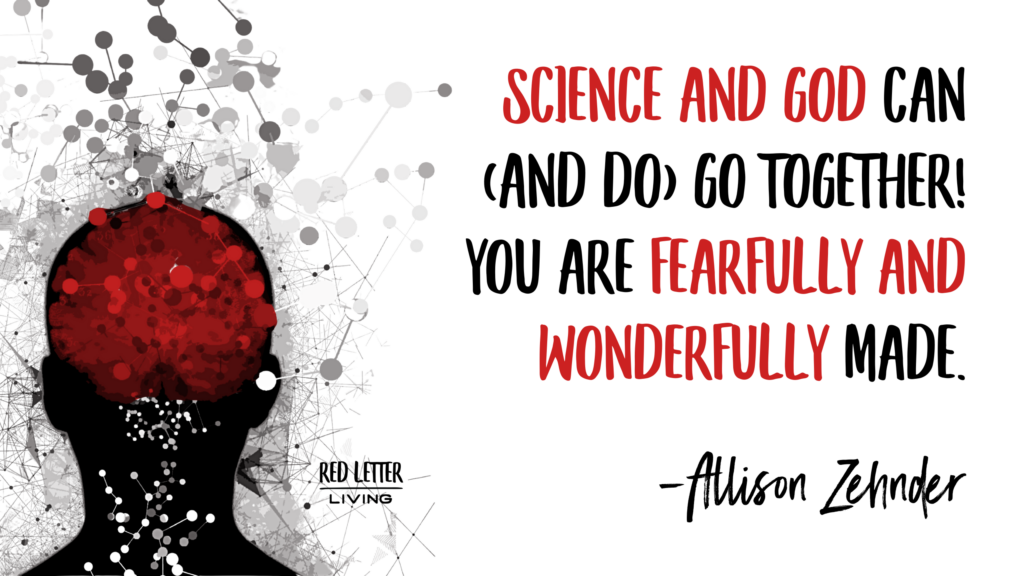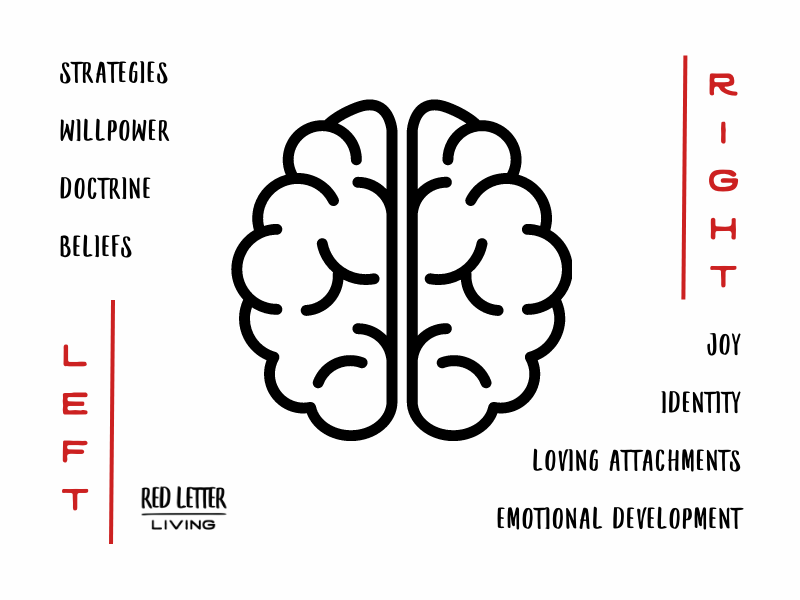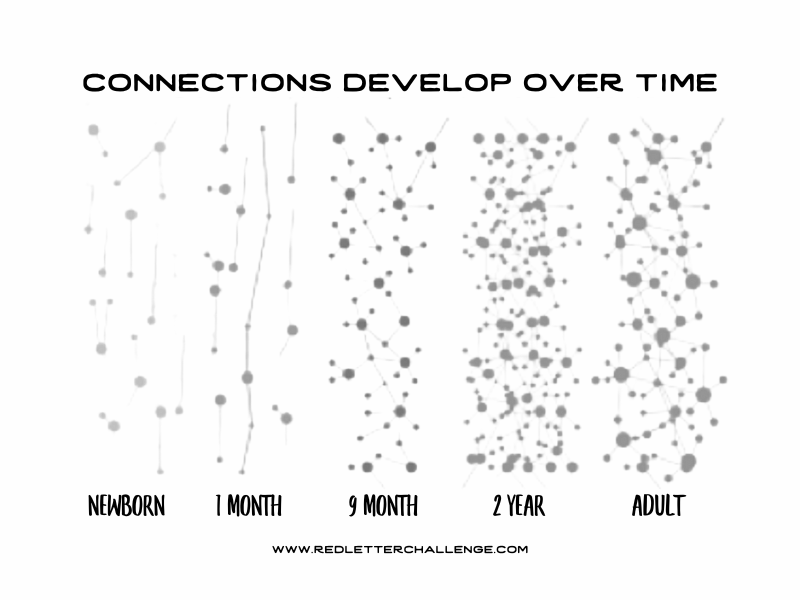

In 1930 an Austrian scientist named Theodore Erismann created goggles that made his whole world look upside down when he wore them. He wanted to see what his brain would do to the images if he kept wearing the goggles. Within five days of keeping the goggles on his face his brain completely adapted to the vision change. Even though the goggles were still upside down, he saw the world right-side up, just as you and I do.
What does this science experiment teach us about discipleship?
It teaches us that we are built for discipleship. You are capable of the change God desires for your life! The better we understand how God created our minds and bodies to work, the better we can use them for His glory. A disciple is a learner. Disciples are moving and growing people of God.
But many of us feel stuck. We feel like we have gotten lodged into a tight space, and to learn something new would be too hard for us. But if the brain can adjust to having its whole world flipped upside down, there’s hope for us.
Below are four ways that brain science impacts discipleship.
1) Brains can change.
Like the goggle experiment shows, brains can literally flip the world upside down in less than a week. This matters when we talk about discipleship because discipleship is a transformative work. It changes us from the inside out to become more like Christ.
Ephesians 4:9-11: So Christ himself gave the apostles, the prophets, the evangelists, the pastors and teachers, to equip his people for works of service, so that the body of Christ may be built up until we all reach unity in the faith and in the knowledge of the Son of God and become mature, attaining to the whole measure of the fullness of Christ.
This discipleship work is HARD WORK! But the changes are difficult so the results will be easy. Dallas Willard says that true discipleship is when we easily and naturally do what Jesus would do and say what Jesus would say if He were in our shoes right now.
What gives us hope in a time of change is that God gives us the ability to do so.
Neuroscientist and Stanford professor Dr. Andrew Huberman said, “The human species was given this tremendous gift of neuroplasticity, the ability to change ourselves and be better in deliberate ways.”
As we fix our eyes on Jesus, we have hope in the knowledge that when He says He will finish the work He has started in us, He is dead serious. (No pun intended! Maybe we should say, He is RISEN-serious!) He absolutely will. Not only will He complete what He started, but He wired our brains to cooperate!
2) We have two halves of our brain, and both sides need to be trained for effective discipleship.

Jim Wilder wrote about these “half-brained” churches and Christians in his book The Other Half of Church: Christian Community, Brain Science, and Overcoming Spiritual Stagnation. He said, “Churches are filled with leaders who are gifted at theology, preaching, and vision-casting, but may not have relational and emotional skills.”
This means many of us know the Bible stories, are sure we are going to heaven when we die, understand the gospel, and can tell you a lot about what we believe. But we aren’t experiencing it in our everyday life. And when trouble comes, many disciples are getting crushed because they have only been training their left side. After studying the brain, scientists tell us our identity and connection comes out of the right side of the brain.
Wilder said, “The right brain processes these questions: Who is happy to see me here? What do I feel right now? Is there anyone here who understands me? How do I act like myself right now? What do my people do in this situation? The answers to these questions drive our character development.”
So how do we connect left with right?
All these are important things that need to be taught and practiced in discipleship. We can’t just leave them to chance.
3) Joy is essential to our brains.
Pastor Jim Wilder shared a story of people who came in for therapy. They came in sad, depressed, and anxious. (That makes sense, people generally wait until it’s bad before getting help.) The problem was their “joy tank” was so low that when they started trying to work on the trauma or places they were stuck, it ran them into the ground. Most of them had to be admitted into the hospital.
So, the therapists tried something else.
When people came in, the first thing they worked on was building joy. Joy-building activities vary between people, but almost everyone benefits from shared meals, eye contact, laughter, and feeling safe. All those things started filling their tanks slowly but surely. So by the time they started talking about their trauma or hardships, they were able to avoid their bodies shutting down.
We can’t work on an empty gas tank. God is the author of joy. He loved His creation and called it good. He wanted to be with His people, and found ways to do it, whether it was a burning bush, incense, a holy altar with gold cherubs on it, a cloud, a fire, a wind, and finally, through Jesus.
Jesus was a joyful person. He was honest and kind. People flocked to Him. They couldn’t help it. I don’t think they just wanted to see a magic show, they wanted some joy. We need to practice relishing and enjoying the process, not just the outcome.
Dr. Andrew Huberman said it this way, “We can use play as a means to enhance neuroplasticity and explore novel situations, regardless of age.”
Here are ways to start building joy:
4) Our brains need community.
Pastor Jim noticed that most people who were struggling to grow in their training as a disciple of Jesus had a right brain issue, and a lot of that came from a lack of community. Here is what he said,
“What I realized later was that the people who did not respond to training likely had right-brain obstacles: low joy, isolation, a lack of loving community, poor identity formation, and unhealed trauma. Each of these was a relational/emotional problem requiring right-brain development. As a pastor, I did not realize that these obstacles even existed. I was ignorant of relational skills and could offer my people encouragement, prayer, Scripture, and spiritual disciplines. For some, it worked well; for others, not at all.”
As we grow into adulthood, the connections in our brain grow stronger and stronger, especially the things we do over and over. Every new experience that you have makes a new connection in your brain. If you do not use connections, they disappear and we forget them. That is why your brain can forget the foreign language class you took in high school.
Those connections are the same with relationships. Being in relationship with others on a continual basis is important. It helps your mind solidify those connections.

What About Red Letter?
As the writers of our challenge book series here at Red Letter Living, we encourage people to do 40-day challenges as entire communities, churches, or small groups. Why? Because it’s what our brain needs. Doing discipleship in groups raises joy, removes isolation, gives you a loving community, helps you form a strong identity, and allows a safe place for processing old scars and wounds.
We took this knowledge about left and right-brained discipleship and took a good hard look at our material. Where are we leaning to the left? Where are we tapping into the right? Here is what we found: our daily devotions typically focus on left-brain learning but the challenges help you take that left-brain knowledge and incorporate it into your right-brained everyday life. You are taking what you know, and making it grow! It will give you a mix of the left AND right-brained discipleship.
Conclusion
It’s exciting to think about our role as a learner, a disciple, of Jesus. It encourages me that I am not stuck in myself, and there is an opportunity to change the trajectory of my future. Absolutely, there are changes we can make. There are ways and places we can improve. But the most important fact of all is that someone didn’t just change a connection in our brain, He changed our connection with God. Jesus changed our destiny, and it’s to Him that we give all honor and thankfulness.
Yes, Theodore Erismann changed a connection in his brain in five days.
But Jesus saved the world in three.
